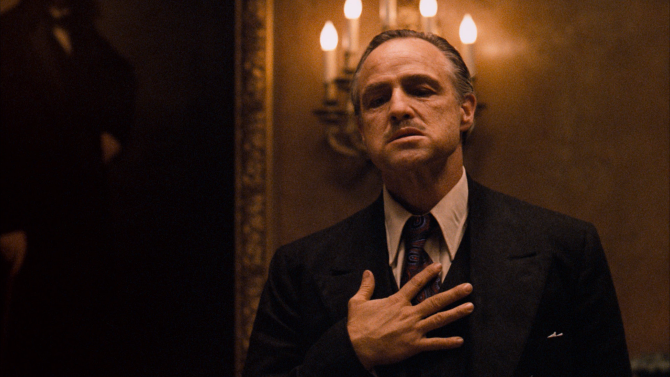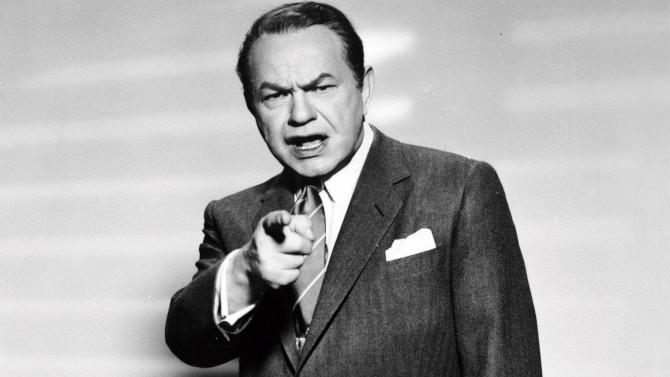
A Law Unto Themselves
The front door to an apartment swings open... an unseen figure walks through the living area and approaches a beautiful blonde woman wearing a robe as she walks around the bathroom... he then deliberately empties the barrel of his revolver into her – this is the jarring cold opening to the film noir Illegal (1955), and one thing is for sure, it knows how to grab your attention. Funnily enough, this was the third adaptation of the 1929 play “The Mouthpiece” by Frank J. Collins, following Mouthpiece (1932) and The Man Who Talked Too Much (1940) – and they say movies are remade too much today. Flash to Victor Scott (Edward G. Robinson), a district attorney who is wise to all the angles and is graced with a silver tongue. With an unyielding desire to win (he got it from growing up and fighting his way out of the slums), he argues every case like it is his last.
-
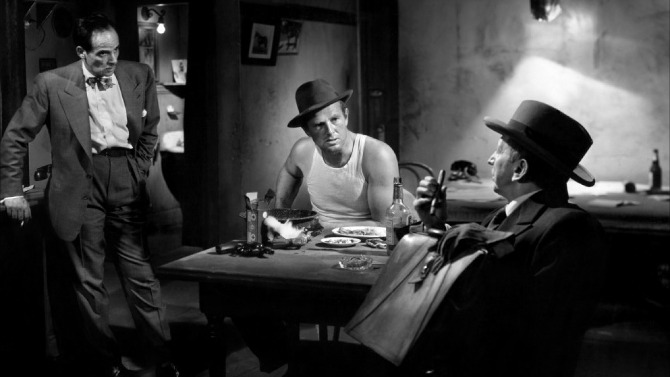
Welcome to the Jungle
The Asphalt JungleNovember 28, 2016Perhaps one of the best descriptive titles to ever come out of Hollywood is The Asphalt Jungle (even though it is the title of the book the film is based on). Directed by John Huston, the 1950 title vividly exemplifies film noir: a dark, gritty, dog-eat-dog world – its only difference from the animalistic wilderness is the stark stone and cement infrastructure that frames the vice-filled world. Oh, and are there vices! Each character has his or her own cross to bear – dragging them down into a world of sin and sorrow. As Doctor Erwin Riedenschneider (Sam Jaffe), the mastermind of the heist, puts it: "One way or another, we all work for our vice". Youthful gals, wealth and extravagance, liquor, gambling on the horses, and an infatuation for a specific man are just some of the misdeeds you’ll find in this movie. The above mentioned Doctor, recently released from prison, has devised an intricate heist – the take, at least one million dollars. Reaching out to a name he heard bandied about on the inside, he visits a bookie by the name of Cobby (Marc Lawrence). Needing the proper backing, a meeting is set between the man with the plan and a prominent, albeit shady lawyer, Alonzo Emmerich (Louis Calhern).
-
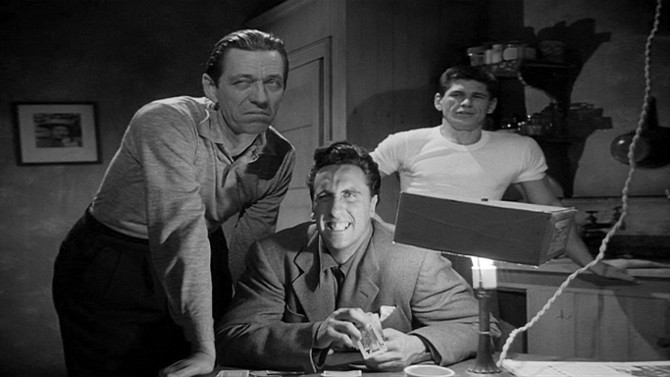
Wave this Noir Flick onto your List
Crime WaveNovember 18, 2016Placing us in the back seat with three escaped convicts, director André De Toth makes us culpable from the very beginning in his 1953 film noir Crime Wave. We know that there is an inevitability to the scene, though at first, we do not know exactly what that is. The three unscrupulous amigos are on a crime wave (who would have thunk it?). Pulling up to a gas station late one night, the attendant finds himself knocked out by the group – they then take their sweet time filling their tank and robbing the store. Soon, a cop drives by, circling around when he does not see his friend at the pump. Things turn ugly, leaving one of the criminals shot and the officer dead with two slugs in his chest. Splitting up, gang leader ‘Doc’ Penny (Ted de Corsia) and his thuggish accomplice Ben Hastings (an early role for Charles Bronson – you can tell this as he is credited as Charles Buchinsky) take off, leaving their wounded compatriot to fend for himself.
-
Star Pick with Steve Paikin
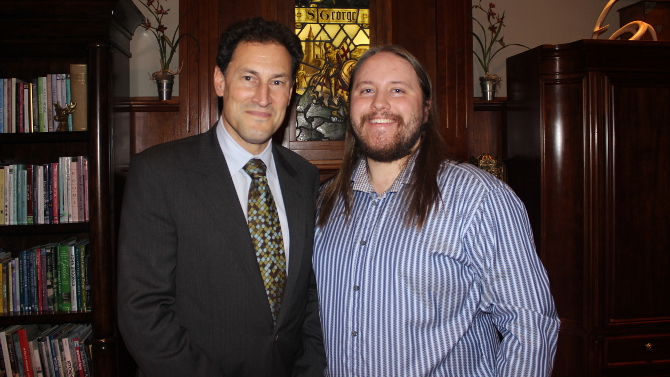 Add this Crime Classic to Your AgendaThe GodfatherNovember 15, 2016
Add this Crime Classic to Your AgendaThe GodfatherNovember 15, 2016This past Saturday, a wonderful event was held in Cornwall, when television personality Steve Paikin spoke to a packed audience along with author Art Milnes about their respective books, politics in North America and a number of historical topics – all to raise money for the Children’s Treatment Centre. It was both an entertaining and enriching experience that left the crowd wanting more. Paikin is perhaps best known for being the knowledgeable and euphonious host of TVO’s current affairs program The Agenda, in which he entertains experts, covering a whole range of subjects from politics to social issues. Also a well respected author, he just released his seventh book entitled, Bill Davis: Nation Builder, and Not So Bland After All – it takes an in depth look at the long serving Ontario Premier.
-
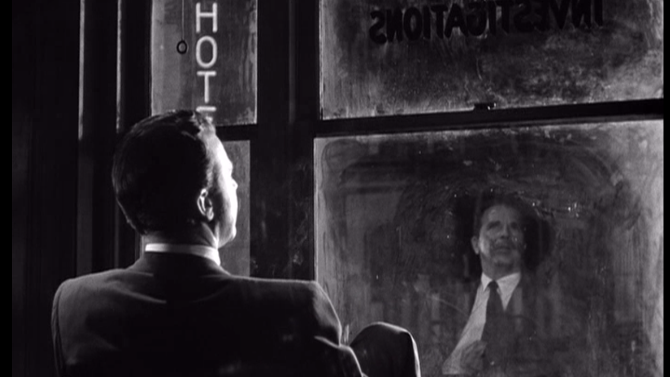
This Noir is a Feast for the Eyes
Murder, My SweetNovember 13, 2016Depicting a nightmarish landscape of big city nights, with a mix of brightly flashing neon signs and foggy, shadowy landscapes, the classic 1944 film noir Murder, My Sweet, directed by Edward Dmytryk (The Caine Mutiny), is a feast for the eyes. Our reflective narrator is Philip Marlowe (played by Dick Powell in this one), his eyes bandaged in ominous fashion as he recounts the strange tale of his most recent mysterious cases to the circling sharks that are the police – especially lieutenant Randall (Don Douglas). The iconic private detective is, as he says, "just a small businessman in a very messy business". Dmytryk’s canvas oozes a certain visual panache, a perfect example being the way in which Marlowe meets a new client. Gazing out at the flashing neon signs from his office, in certain lights, he sees a face no one could forget (though at first it feels like some sort of vision or premonition). Soon, he realizes that there is a behemoth of a man standing behind him, named ‘Moose’ Malloy (Mike Mazurki) – he is a tough, thuggish giant who lacks brains, but makes up for it with brawn and a stick-to-it-iveness that is difficult to ignore. Marlowe soon realizes that the confused man won’t take no for an answer, so he accepts the money being offered to him and decides to hear him out.
-
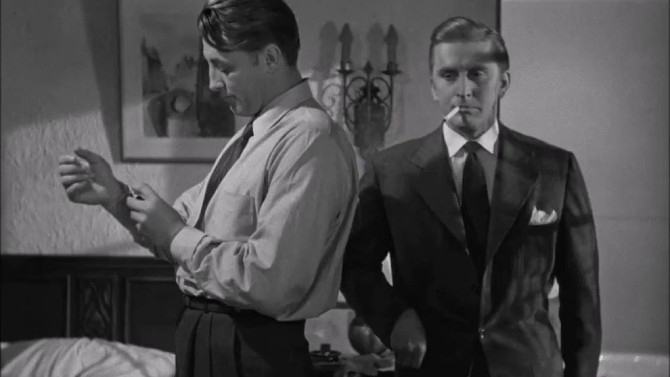
Shadowy Past Equals Grave Future
Out of the PastNovember 4, 2016Though we have all become accustomed to November being coined Movember, there is another moniker that is perhaps lesser known. ‘Noirvember’ has, over the last few years, gone viral, making this eleventh month of the year the perfect one to celebrate the shadowy, gloom filled, doom-laden film noirs of the 1940s and 50s. So, I thought I would start us off with a bang by reviewing the classic 1947 crime noir Out of the Past. Written by Daniel Mainwaring (he wrote the screenplay and the novel the film is based off of under the pseudonym Geoffrey Homes – titled "Build My Gallows High") and directed by Jacques Tourneur (Cat People), past mistakes meet present danger when gas station owner Jeff Bailey (Robert Mitchum), who has been hiding in a small California town after a torrid life, is tracked down by Joe Stefanos (Paul Valentine), a trusted henchman for a smooth but sketchy gangster named Whit Sterling (Kirk Douglas).
-
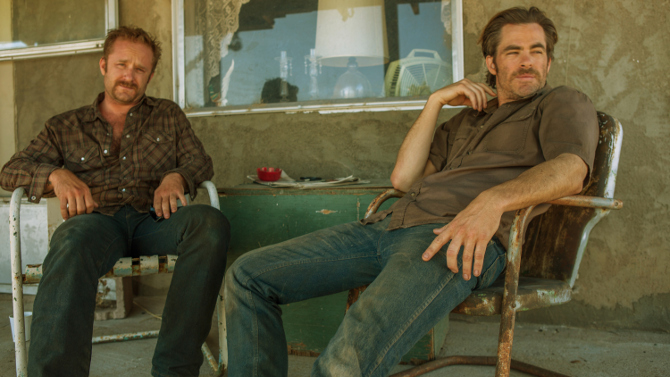
Highway to Hell or High Water
Hell or High WaterOctober 7, 2016Taking characters from the classic western and transporting them into the modern age, Hell or High Water has its requisite share of cowboys, Indians, and cops and robbers, though it cleverly pairs the cowboy and Indian as two Texas Rangers hunting down a pair of outlaw bank robbers. Written by Taylor Sheridan and directed by David Mackenzie, the story follows brothers Tanner (Ben Foster) and Toby Howard (Chris Pine) as they travel through small Texas towns, robbing bank after bank as they go. Tanner, the older sibling, is a wild card criminal who has spent ten of his thirty-nine years behind bars. The brains of the operation, however, is Toby, a charming, clever man who meticulously plans each robbery. He has a melancholic aura, as the death of his mother, as well as a strained relationship with his ex-wife and two sons, has left him flapping alone in the wind.

